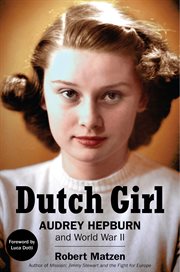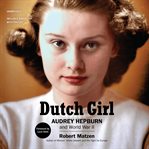Review by Publisher's Weekly Review
Matzen (Mission: Jimmy Stewart) completes his trilogy of books about Hollywood figures during WWII with this exciting volume about Audrey Hepburn's childhood and adolescence under the Nazi occupation of Holland. At first, Hepburn is largely a supporting player, having been only 11 when the Nazis invaded (she later said, "A child is a child is a child; I just went to school"). Instead, Matzen focuses on Hepburn's mother (by then divorced from Hepburn's father), a socialite and longtime Nazi sympathizer, and other family members, including her uncle, who was held by the Nazis and eventually shot in retaliation for Dutch resistance activity. Nevertheless, Matzen shows how war shaped Hepburn's resilient and fiercely private personality and informed her work as a UNICEF ambassador later in life. And all is not gloom and doom, as he explores Hepburn's fascination with dance, and her dreams of becoming a ballerina. More dominant, however, is the wartime background. Visceral details-of intense privation ("I went as long as three days without food" Hepburn recalled), constant bombings, and also acts of resistance-evoke the period. Matzen has created a vivid portrait of a civilian population under siege-one of who just happened to become a Hollywood star. (Apr.) © Copyright PWxyz, LLC. All rights reserved.
Review by Library Journal Review
Matzen, who's previously examined World War II's impact on Hollywood stars (Fireball; Mission), turns to Audrey Hepburn and her life during the Nazi occupation of the Netherlands. The war years coincided with Hepburn's adolescence, and the author chronicles the actor's early performances as a dancer and her relationship with her dynamic mother, while showing how the war affected them both. This is a vivid exploration of Hepburn, her family, and the experiences of the Dutch population. Matzen discusses how Hepburn's uncle Otto, Count van Limburg Stirum, was detained and eventually executed by the Nazis, and evocatively depicts the resistance movement, the massive battles in and around Arnhem as the Allies attempted to liberate the country, and the months of near-starvation conditions in the final winter of the war. VERDICT A meticulously detailed and researched look at the formative years of an iconic performer; for fans of Hepburn as well as anyone seeking a social history of the Dutch experience of World War II.- James Collins, Morristown-Morris Twp. P.L., NJ © Copyright 2019. Library Journals LLC, a wholly owned subsidiary of Media Source, Inc. No redistribution permitted.
(c) Copyright Library Journals LLC, a wholly owned subsidiary of Media Source, Inc. No redistribution permitted.
Review by Kirkus Book Review
A popular biographer's intimate portrait of Audrey Hepburn's wartime experiences. Before the world knew Audrey as an actress and UNICEF humanitarian, she was born Adriaantje, in 1929. With this scrupulous account of Hepburn's upbringing in Belgium, England, and the Netherlands--elements that previous biographies have only glanced at--Matzen completes his trilogy on Hollywood stars during World War II, following books on Jimmy Stewart and Carole Lombard. The author delves into the attraction of fascism for Hepburn's mother, Baroness Ella van Heemstra, and father, Joseph Ruston. He opens the book with a chilling passage about Ella's meeting with Hitler in 1935. "He was so pale, so composed as he smiled that enigmatic smile, full of humility, the one seen so often in newsreels flickering on screens around the world," writes Matzen. "He reached out his hand and accepted hers lightly." After Joseph left the family, Hepburn's life was irreversibly altered, as it would be again when the Germans invaded their town. The author interweaves detailed military and social history with Ella's lineage, quotes from Hepburn, fragments from the diaries of her contemporaries, and interviews with people who knew her. Hepburn seldom spoke of Ella's early Nazi support or her own war efforts, but Matzen resurrects this history, thoroughly contextualizing Ella's dominant personality. In addition to documenting the family's many traumas, the author explores Hepburn's love for ballet, and accounts of early film auditions add light to the bleakness. When thoughts and impressions are ascribed to Hepburn--e.g., her reaction to Anne Frank's diary (" 'There were floods of tears," Audrey said of that first encounter with the writing of Anne Frank. 'I became hysterical.' ") and her 1992 trip to Somalia--the journalistic text is often moving but sometimes slows the narrative flow. Nonetheless, Matzen's labor of love amply shows how war shaped Hepburn's worldview. Useful chapter notes blend bibliographic sources with the author's reasoning for engaging with specific topics. An illuminating and devastating examination of an icon and her dramatic experiences. Copyright (c) Kirkus Reviews, used with permission.
Copyright (c) Kirkus Reviews, used with permission.


